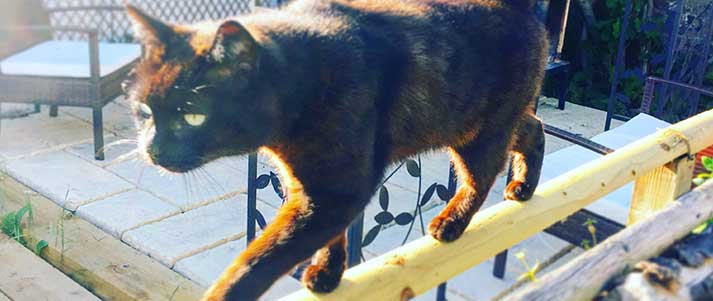How to make money pet sitting
Are you missing the family pet now you're at uni? Getting paid to cuddle cute, furry animals with pet-sitting jobs could be the answer.

Credit: asia.marangio – Shutterstock
In our latest National Student Money Survey, 58% of surveyed students said they have a part-time job to get by at university.
Unfortunately, some student jobs don't fit with uni schedules and employers aren't always able to be flexible.
Pet sitting lets you set your own hours and pay. You could end up earning £50 or more each day. Not to mention, there's the nice little bonus of earning money by spending time with your favourite animals...
Interested? We thought so. This guide has everything you need to know about becoming a pet sitter. Plus, it includes some pictures of our pets that you won't want to miss.
What's in this guide?
What is pet sitting?

When they ask who's a good boy, and you know it's you
Pet sitting is a lot like working as a babysitter. The difference is that you're looking after someone's pet, and not their child. Makes sense.
Some pet owners prefer to have someone look after their furry bundle of joy instead of using a cattery or kennel. This could be for a number of reasons. For example, paying someone to sit could be cheaper, or maybe their pet gets stressed being away from home.
Depending on the job, you could find yourself looking after the animal at either the owner's house (as a pet sitter and house sitter) or your own place.
If you've only got a few hours spare and can't commit to several days of care, there are other options. You could become a dog walker, start a doggy daycare centre at your house or just keep pets company during the day while their owner is working.
In a nutshell, you need to feed them, play with them and keep them safe. It's exactly what you'd do when looking after your own pet.
5 best and worst parts of pet sitting
If you're interested in making money as a pet sitter, it's important to know these pros and cons.
Pros
Here are some advantages that come with being a pet sitter:
- You get to look after animals and get paid for it.
- If you want to work with animals in the future, pet sitting will look brilliant on your CV. It's a bonus if you can get references from happy customers.
- Pets may need to be fed at a certain time, so you need to get there on time. This is a great way to improve your time management and organisation skills.
- You can work whenever you want and choose your hourly pay.
- Spending time with animals can boost your mood and academic performance.
Cons
But there are also some disadvantages of being a pet sitter:
- Work may be sparse. Work opportunities depend on where you are, and if anyone else is offering a similar service.
- You may be expected to give pets medication if required. In case you didn't already know, this isn't something they tend to enjoy.
- Pet owners may be fussy. Understandable, yes, but does Fido really need to be fed boiled chicken, hand-cut into one-inch pieces, and for you to make whale noises to get him to sleep?
- You may need a car to pick up and drop off animals if you are pet-sitting in your own home.
- If you use a website to find pet-sitting jobs near you, expect them to charge an advertising fee.
Do you need a licence to be a pet sitter?

Oh, can't you walk on fences, too?
Technically, you don't necessarily need a licence to be a pet sitter. But, if you're going to be caring for other people's pets in your own home, you will need an animal boarding establishment licence.
The rules on this licence vary from council to council. However, you'll almost always need one if you're keeping animals in your home overnight. Sometimes, you'll need one for daytime care, too.
The cost of an animal boarding establishment licence also varies depending on the council, usually costing anywhere between £100 – £500. While that may seem expensive, being caught without a licence can result in a fine of an unlimited amount or imprisonment for up to 6 months.
It's definitely worth getting an animal boarding establishment licence, or at least checking if you need one.
You may also need a basic DBS check. This is especially a good idea if you will be staying in another person's house. You can apply for a DBS check.
Other than that, there are no official qualifications needed to be a pet sitter in the UK. In theory, anyone can do it. That said, there's no harm in having some relevant experience or qualifications to help set yourself apart from the crowd.
While we're not expecting you all to be vet students (although if you are, that'll stand you in good stead), make sure your pet-sitting profile mentions the experience that you do have. If you've had pets from a young age, learned to ride horses or regularly walk the neighbour's dog, mention it. It shows that you're good with animals and that you care about them.
Do you need insurance to be a pet sitter?
While you don't necessarily need to have insurance to be a pet sitter, a lot of owners will appreciate it if you do.
Aside from showing potential customers that you're a conscientious and responsible pet sitter, it will also protect you if anything goes wrong.
Depending on the package you go for, you could be covered for a range of things. For example, if the animal falls ill or passes away in your care, if the animal damages a third party or their property, or even losing the keys to the owner's house.
Packages can start from around £5.50 a month. Given how much you can earn from pet sitting (and the potential cost to you if something bad happens), it's worth considering taking out some cover.
How much do pet sitters make?

You're doing amazing, sweetie
If you're wondering how much demand there is for pet sitting where you live, have a look at what other people are charging. Here are some benchmark figures of how much you can earn as a pet sitter:
| Type of work | Typical pay |
|---|---|
| Pet sitting while the owner is away or at work | £10 – £25 per hour |
| Dog walking | £10 per walk (with extra charges for more than one dog) |
| Dog sitting at your house for a few hours | From £15 |
| Pet sitting overnight at the owner's house | £25 – £60+ per hour |
Remember that these are just ballpark figures. Depending on where you live and what the pets are, you could get more or less than this.
If you go the extra mile while pet sitting, you can potentially charge more and even get yourself some regular business. You could also offer to water the garden or pick up their post.
You should always make a genuine effort to help animals feel at ease around you. This could mean giving them treats or sending the owner regular texts or pictures to let them know their pets are okay.
How to become a pet sitter

Dusty was VERY dapper at Lauren's graduation
To find paid pet-sitting jobs, start by asking family and friends if they know anyone who needs your services. You could also post on local Facebook pages or Gumtree. Or, if you're feeling old school, you could even put up some posters or flyers in the local area.
If you're after something a little more structured, some pet-sitting websites will introduce you to owners. If you work through these companies, you may even be covered by their insurance (always check the specifics though, just in case).
Best pet-sitting job websites
Here are the best pet-sitting websites:
-
Tailster
While the logo may suggest otherwise, the site focuses on more than just dogs. You can also find cat sitters or someone to look after a smaller pet. However, dogs are in the spotlight on Tailster – namely, the walking and boarding of them.
Access to the platform is free, and you'll get to keep 70% of your earnings. Tailster takes the remaining 30% as a service fee.
-
Cat in a Flat
Want to know how to become a cat sitter? Cat in a Flat is the site for you. It's solely for cat sitting, and you can offer to cat sit for short periods or overnight.
You (and the cat) will be fully insured by the website, and you'll be expected to send the owner a picture of their kitty every day.
It's free to join the site but Cat in a Flat charges a 19% fee to cover insurance and commission.
-
Rover
Rover (previously DogBuddy) is specifically for cat and dog owners. It's the perfect place to get paid to cat or dog sit.
As a pet sitter, you can offer dog walking, home visits, doggy daycare, house sitting or boarding.
Rover's fees are a bit lower than some of the other sites. They'll take a 15% cut when you get bookings through the site.
-
Pawshake
Don't want to commit to caring for just one type of animal? On Pawshake, you can find yourself looking after anything from dogs to birds.
Services you can offer include dog walking, doggy daycare and overnight stays.
It's free to sign up but there's a fee of 19% when you make bookings through Pawshake.
-
Trusted Housesitters
If you're looking for pet-watching jobs and you're not bothered about earning money but want to do a bit of travelling, you could housesit instead.
Trusted Housesitters matches global trekkers with homeowners all over the world who need a pet sitter in exchange for free accommodation.
You need to pay a fee of £99 a year to advertise. Depending on where you're travelling to, you could be making that back in as little as one or two nights' worth of free accommodation.
If you'd rather have a more reliable source of income, why not look into getting one of the best-paid student jobs?













